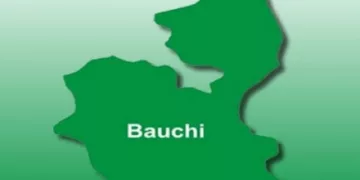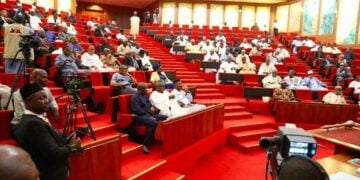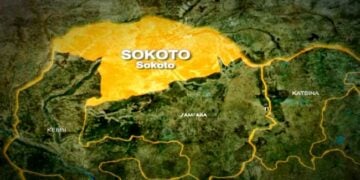Stakeholders have declared that the American model of presidential democracy has done more harm than good for Nigeria, particularly in the last 25 years of the country’s democratic journey, but called for circumspection in considering the parliamentary method.
They made these observations at a national discourse on a home-grown parliamentary system of government organised by the Home-Grown Parliamentary System Support Group (PSSG) in Abuja on Monday.
PSSG is a group of 83 members of the House of Representatives who are sponsoring three bills to alter the 1999 Constitution to transition from the current presidential to a parliamentary system at all levels—federal, state, and local government.
In his remarks, Dr Usman Bugaje, a former presidential aide who was the Guest Speaker at the event, said the last 25 years of presidential democracy had not actually given Nigerian citizens what they were expecting from their governments.
The former lawmaker said that, if anything, three major things have happened in the last 25 years since Nigeria adopted the American model of democracy: deepening poverty, escalating security, and mind-boggling corruption.
“You look at the statistics, even if you only have to go to the World Bank or UNDP, just look at the statistics at the National Bureau for Statistics. You see how poverty has been deepening in the last 25 years.
“You look at the escalating security. I mean, 1999 was pretty peaceful despite the transition into the military. But look at what has happened 10 years later, another 10 years later, where we are now. New bandits are arriving in our land, even as we have not quite finished with the ones already showing their faces.
“Mind-boggling corruption. Now, this is a grave matter. I know it’s a bit uncomfortable discussing it. These are some things we prefer to sweep under the carpet, but they will keep coming up because they are a fundamental breach of democratic practices. They cumulatively undermine the political system and create a crisis, the kind of which we will not be able to recover,” he said.
The former national secretary of the defunct Action Congress blamed lawmakers for Nigeria’s woes: “Today, our parliament is not playing the role they should.
“They have largely become rubber stamped and have been part of the problem of this country. You have extricated yourself from part of that image; you have come out and played the role the Constitution gave you.”
On the proposed system of government, he said: “I like the idea of the homegrown effort. This is a crucial word because borrowing a system nurtured in an entirely different history, social, and cultural environment will not work for you.
“You are supposed to work your system. If we keep borrowing and borrowing and borrowing, we’ll become enslaved by ideas and systems that do not quite fit and solve our problems. For this purpose, we must underscore its significance.
“When we look at our homegrown system, like I said, we need to broaden the discussion. One, we have to look at this as a process of reinventing our politics because our politics is sick, decaying, and citizens are agitating because it does not give them what they are looking for.”
Similarly, Professor Ango Abdullahi, a former vice chancellor of Ahmadu Bello University, Zaria, and convener of the Northern Elders Forum, said the country’s situation is worse under the presidential democracy experimented in the past 24 years than under the four-year stint of the parliamentary system of government.
Abdullahi, chairman of the occasion, said Nigeria’s adoption of the American presidential system was “our first mistake for us to bring a system that did not fit our history, traditions, our experience.
“Now we have experienced a presidential system for 24 years. With due respect, our situation is worse than under the parliamentary system, which we exempted after trying it for four or five years. One of the things we did wrongly was to bring in a system that did not fit us.”
While supporting the adoption of a new system of government for the country, he said, “…we should work on something. It must not necessarily be a typical parliamentary system from our former colonial masters; it could be something else. The presidential system did not work for us, and we need to change to something else.”
On his part, a leader of the PSSG, Hon Abdussamad Dasuki (PDP, Sokoto), said the presidential system has, in the last 25 years, shown that it was not the democracy “we desire,
nor the one our founding fathers envisaged.”
He said: “A closer look at our system reveals fractures that can no longer be ignored, dreams left unfulfilled, and gaps that beg to be filled. Now is the time to address these issues.
“Now is the time to rethink an escape route from this reality. Now is the time to set our minds on crafting a new path—a cure for the affliction that has transformed our democracy into a spectacle of pity.
For years, we have argued and debated how to cure this affliction. Still, we must constantly remind ourselves that the core problem lies in the vehicle through which we experience this democracy: the current Presidential system.
“We need an alternative. But what should replace this presidential model—a mere imitation of the American system—must be a home-grown solution. This answer is not for any individual or group to dictate; it must emerge from a genuine dialogue among Nigerians, especially between the young and the old, the new generation and those before them.”
In his remarks, Speaker Abbas Tajudeen insisted that a home-grown parliamentary system must reflect the procedural aspects of governance and the intrinsic values, goals, and cultural nuances of the people it serves.
Represented by the former House Leader, Hon. Alhasan Ado-Doguwa, the speaker said the system should be a leadership model grounded in substance, not merely in style – I am creating a legislative system that resonates with Nigerians’ everyday realities, aspirations, and diversity.
“As we examine potential reforms, I am aware that a unicameral system of government is often discussed. However, we must recognise that Nigeria’s vast geographical and cultural diversity poses unique demands.
“Unlike smaller or more homogeneous nations, our bicameral system has enabled us to balance representation across regions and ethnic groups, enhancing inclusivity and participation in the democratic process.
“Any significant structural change must be carefully considered within Nigeria’s complexities to avoid unintended consequences.8. Some have also suggested adopting part-time legislators.
“However, I must respectfully challenge this notion, as it may underestimate legislators’ profound responsibility.
Instead, we should focus on embedding our legislative values into a home-grown model,” he said.
In a panel discussion, House Minority Leader and leader of the pro-parliamentary lawmakers, Hon. Kingsley Chinda, said the present laws based on the presidential model have so many loopholes that it is comfortable for public officeholders to do things and get away with them quickly.
“This system has inherent loopholes that will allow those administering to go scot-free, but they will need to tighten it. For us, a homegrown system is the one that will look at the problems that we have, issues of corruption, accountability, transparency, and character in office, as well as how the laws will take care of that.
“I don’t believe in the death penalty, but if the death penalty could solve our problems, we will go ahead and use the death penalty for public office holders,” he said.
For former governor of Osun State, Rauf Aregbesola, any system of government that does not entrench strict accountability measures will not provide the needed results for the country, which is now overshadowed by poverty, insecurity, and other anomalies.









